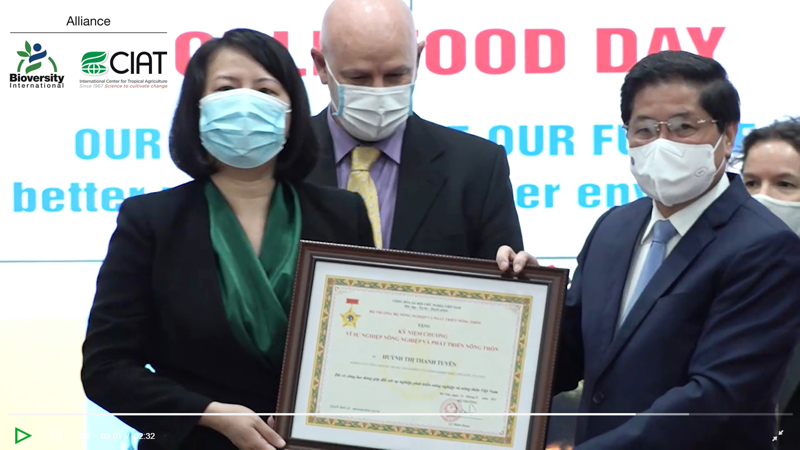Ms. Tuyen Huynh, a Senior Researcher at the Alliance of Bioversity International and CIAT and the CGIAR Research Program on Agriculture for Nutrition (A4NH), has been awarded the Medal of Contribution to Agriculture and Rural Development in Vietnam by the Ministry of Agriculture and Rural Development (MARD).
The recognition is the highest honor given by the ministry to organizations or individuals who have made significant contributions to the advancement of agriculture and rural development in the country.
In celebration of World Food Day in Vietnam, MARD, together with the UN Food and Agriculture Organization in Vietnam, sought to recognize individuals and organizations who have played a significant role in the UN Food System Summit process in the country.
It comes after Ms. Huynh helped consolidate actions and ideas for a successful series of national and sub-national dialogues, including a CGIAR independent dialogue in June and July 2021. Through these dialogues, the government can find opportunities that allow it to forge transparent, responsible, and sustainable food systems.
“This award is a direct result of the work of the CGIAR in Vietnam, and is recognition that our work is aligning with priorities not just in agriculture but also in nutrition and health,” Ms. Huynh said. “We have been playing a role in connecting people, research, and policy together, to attract the attention of multiple stakeholders and highlight the common benefits for all.”
The collaborative work of Ms. Huynh, the Alliance, and the CGIAR helped implement and review food system policies and develop frameworks in transforming food systems in Vietnam. The Alliance-led food system profiles released this year are one of the main sources used to contextualize current issues for diets and nutrition in the country. The profiles have been shared to support local socio-economic development planning.
Beyond the Summit
Before the preparations for the UN Food System Summit, Ms. Huynh was invited to the appraisal group to develop training materials for the Zero Hunger National Action Program for 2020-2025. The Zero Hunger Program aims not just to minimize hunger but to improve overall nutrition in time for the Sustainable Development Goals for 2030.
The work on Zero Hunger led to the development of frameworks that can be applied locally using assessment indicators developed by the bigger A4NH research community. This work outlines how to conduct research-sensitive work from the provincial to the national level.
Besides the growing portfolio of work in providing baselines and technical input on policy development, the work on food systems coordinated in Vietnam also includes providing support to small and medium-sized enterprises (SMEs) to improve business practices and the need to make diets and healthier lifestyles accessible.
With more concrete action after the UN Food System Summit, the government can draft food system pathways based on outcomes and discussions made during the dialogues, including the CGIAR independent dialogue.
Ms. Huynh emphasized the great need to integrate visions that involve stakeholders and sectors at different levels. She said that the Food System Summit is not the end of the conversation but should signify the strong calls from the government inviting collaboration for innovation. In mapping out the sectors and stakeholders involved, there is a better understanding of individual outputs that can contribute to collective positive outcomes.









 Google translate
Google translate